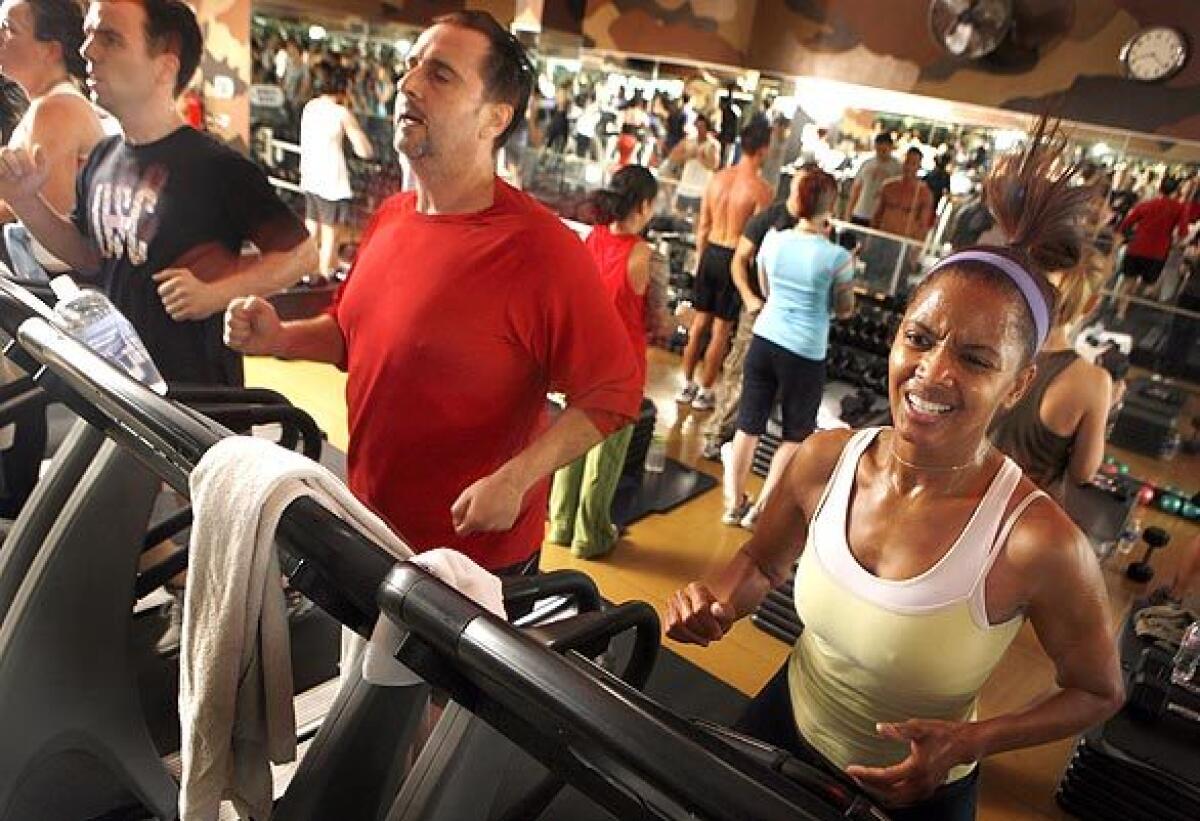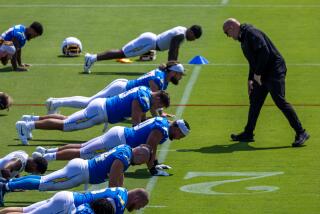Fitness boot camps offer what gyms cannot

When the New Year’s resolution calls for getting in shape fast, joining a gym and pushing yourself hard every day probably won’t happen. What will work? Having someone scream, “Drop and give me 20!”
Fitness boot camps may be one of the fastest ways to go from zero to fit. The setup is simple enough: A trainer leads a group of clients through an intense hour of cardio and functional-strength training. The secret lies in the circuit-style workout that toggles between cardio and muscle building. This leaves little if any down time, and the shuffling of routines prevents boredom and exercise ruts. For people willing to put in the work, boot camps enable exercisers to see results quickly, the better to stay motivated.
“It’s a very efficient workout because you’re working your whole body in a short period of time,” says Cedric Bryant, chief science officer for the American Council on Exercise. “It’s fun, and the exercises are different, so you’re not going to get bored.”
Los Angeles-based actor Ed Stanley made his New Year’s resolution to get fit a year ago, joining Boot Camp L.A., a nearly decade-old program that takes place six days a week at the park by the Page Museum on the Miracle Mile. Stanley wasn’t happy with the ever-increasing size of his waist.
“I knew that I needed to be accountable,” he says. “But I didn’t expect it to be fun. It’s challenging, but it’s also fun.”
He now takes pride in pushing himself to achieve athletic goals he didn’t think possible. “I never thought of myself as an athlete,” he says. “But I ran a 5K within a month of starting boot camp. And I thought, ‘I really have to start looking at what I tell myself.’ ”
Stanley says he lost about 15 pounds in two months. “After about three weeks, I looked in the mirror and noticed my body was starting to transform.”
Teammates
Boot camps have some special features. Many are held outdoors and often incorporate common environmental features such as stairs or ledges for cardio as well as functional exercises using only body weight or free weights. Encouragement comes not just from the instructor but also from the other participants, who cheer and clap for fellow campers. And people are often paired or grouped for friendly competitions, fostering a camaraderie and support not usually found in regular fitness classes.
That camaraderie strengthens with time, establishing accountability, something fitness experts say is essential for sticking with a program. After you establish a presence in the program, other participants expect you to show up -- and they may call if you don’t. While some people sign up for only one or two monthlong sessions to get in decent shape before moving onto other sports and activities, others stay for years. Weight loss depends on diet, metabolism and how much effort is put into class, but can be maintained by continuing to take part in boot camp, or segueing into something else.
“It definitely helps push people,” says Jay Kerwin, Boot Camp L.A.’s founder. “If we’re doing stair drills and someone is tired, someone else will say, ‘Let’s go slowly, and I’ll go with you.’ ”
“I’ve seen people say, ‘I’ll see you here tomorrow’ -- and they shake on it,” says Barry Jay, who has been at the helm of Barry’s Bootcamp in West Hollywood since 1998. He’s expanded his boot camp to other locations (where sessions are led by other instructors) and a series of DVDs, but he still commands the troops at his indoor studio, putting men and women through their grueling but enthusiastic paces every day.
“Boot camp means commitment,” Jay says. “You can join a gym and not go, but if you sign up for boot camp for a month it tells you where to be five days a week. The workout is hard, but you could never do this on your own. You can’t go to the gym and duplicate this.”
Some newcomers, or potential newcomers, are intimidated by the programs. Kerwin says they shouldn’t be.
Classes are filled with many first-timers or people who haven’t exercised in a while, especially in January, he points out. “This is not triathlete boot camp; this is regular-people boot camp. If you were in great shape, you’d be the trainer,” says Kerwin, adding he modifies exercises for those with bad knees or weak backs.
Boot camps do share one thing with other fitness programs: muscle soreness.
That probably can’t be avoided, but, Jay says, it shouldn’t be bad enough to derail fitness plans. “The fact is, if you haven’t done anything, there’s no way around being sore. It’s something everyone has to go through. But if you’re feeling like you can’t get out of bed, you can. The first week is the worst week, but after that you’re going to feel great. Take a couple of Advil.”
Despite the moniker, most boot camps aren’t anything like the real deal. Instructors may be tough and demanding, but few call clients “maggot” and push people until they vomit.
Kerwin learned not to do this the hard way -- he served in the Air Force special ops for four years and tried the angry drill instructor persona when he first started teaching boot camp. He quickly realized that wasn’t going over well. “The average person doesn’t want to get yelled at,” he says. He does, however, have clients who address him as “Major,” and he sometimes makes them run while singing the cadences he learned in the military.
Old dogs, new tricks
Boot camps have become such an indelible part of the fitness culture, having proved their get-you-into-shape-fast effectiveness over the last decade or so, they’ve spawned a host of variations. Beach boot camps take advantage of the sand and water; bridal boot camps help brides fit into their gowns. Some are geared toward women, children or seniors, and others are sports-specific. Each location and instructor brings a different environment or atmosphere.
At Thank Dog Bootcamp, people work out with their dogs, which not only get exercise but behavior training as well. “You’re not only doing it for you, you’re also doing it for your dog,” says Jamie Bowers, who co-founded the Burbank-based program with her twin sister last year (classes are also held in Long Beach, Orange County and Northern California). “It also gets everything done in one hour. Everyone’s busy, and people don’t want to work all day and come home and train their dogs.”
Dogs and humans have separate trainers and go through an initial consultation before the first class. Dogs may practice following the “stay” command while their owners do some weight training, and both get some cardio workouts on the grass.
Finding a suitable boot camp may take a few tries -- the setting may feel uncomfortable or the instructor might not be a good fit. If you’d really rather slug the instructor or if you’re bored by him or her, the class won’t do much good. Although instructors should do a health screening for new students, participants themselves should be up front about any injuries or chronic conditions.
Bryant says boot camp is not something to be entered into lightly -- preparation is key. “Make sure you get adequate rest and that you get adequate nutrition -- those things are going to impact how enjoyable the actual workout is going to be.”
He adds that über-competitive former athlete types may need to check their egos at the door. “They need to be man or woman enough to back off and not attempt to keep up with everyone. Maybe you don’t do every exercise that everyone else is doing, and you can’t be so prideful that you say, ‘I’m going to do it even if it kills me.’ ”
“That you continue to show up and enjoy it is half the battle,” Jay says. “It’s hard, yes, but people are having a great time.”






